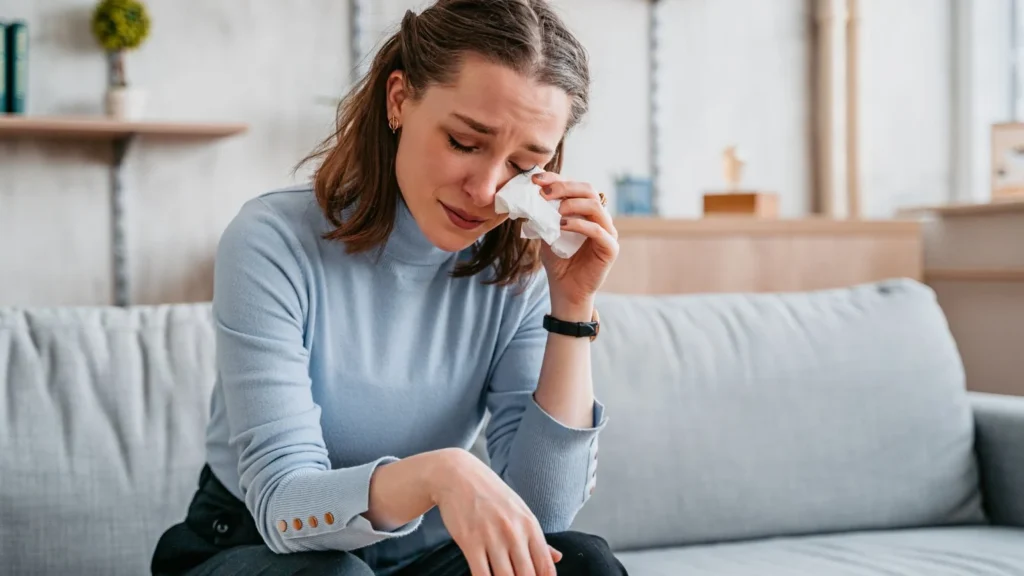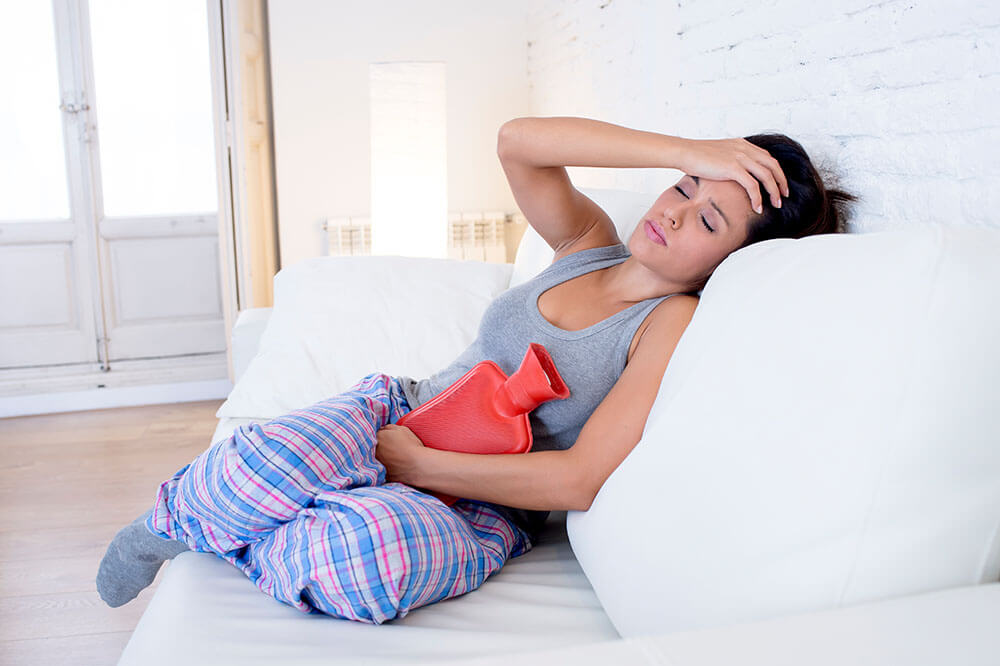Many women experience various emotional changes and physical symptoms before menstruation, called PMS; this phenomenon is more of a disorder than a disease.
Depression during menstruation, if it becomes very severe, can be a symptom of premenstrual depression or PMDD (Premenstrual Dysphoric Disorder). Also, sometimes, this mood change and feeling of depression starts after the end of the period, which is called postmenstrual syndrome.
Environmental stress ge, genetic factors, or hormonal imbalance can be the causes of these disorders.
Premenstrual Dysphoric Disorder (PMDD)
Premenstrual dysphoric disorder, or PMDD, is a more severe form of premenstrual syndrome (PMS). Usually, most women of reproductive age experience PMS symptoms before menstruation, which include high appetite, breast tenderness, muscle cramps, moodiness, and fatigue.
However, women who suffer from premenstrual depression constitute about 3-8% of the female population. Their symptoms include anger, irritability, depression, and internal tension, which are severe enough to interfere with daily activities. do
Premenstrual syndrome or PMS
As mentioned, premenstrual syndrome occurs in most women of reproductive age. It includes physical, emotional, and behavioral symptoms such as breast pain, bloating, fatigue, irritability, depression, anxiety, etc.

The cause of PMS and PMDD
The primary and exact cause of PMS and PMDD in the menstrual cycle is not known. Still, hormonal changes in the second half of menstruation can be considered one of its leading causes. Changes in estrogen and progesterone levels affect the amount of serotonin secretion. Serotonin is a neurotransmitter that regulates appetite, sleep cycle, and mood. If the level of this hormone is low, it leads to feelings of anger, sadness, increased appetite, and sleep disturbance.
In addition to the mentioned symptoms, the following symptoms may also occur:
• Anxiety
• Bloating
• Nausea
• Anger
• Decreased libido
• Forgetfulness
• Tendency to cry a lot
• Too little or too much sleep
• Fatigue and boredom
• Decreased or increased appetite
Postmenstrual syndrome
Postmenstrual syndrome is a new term in the medical world. This name is derived from the mental and physical symptoms that occur after the end of the menstrual period. These symptoms can range from physical symptoms, such as headaches, to emotional symptoms, such as anxiety states.
Although PMS has symptoms similar to those of PMS, they differ. In postmenstrual syndrome, the symptoms always occur after the end of the menstrual period. Still, PMS always occurs sometime before the period. The psychological manifestations of postmenstrual syndrome are also more severe than PMS.
Why does depression get worse during periods?
If you have had a restless and unwell mental period during the month, menstrual depression will also be more severe; in a small number of cases, women report suicidal thoughts during this period. Depression affects the period and can lead to the cessation of the period or the irregularity of the menstrual cycle.
During periods of anxiety and depression, the function of the hypothalamus gland is disturbed. The hypothalamus regulates the function of the pituitary gland, which plays a role in the proper functioning of the ovaries. Disruption of the ovaries’ function causes problems in the production of estrogen and ovulation, and as a result, the menstrual cycle becomes irregular.
It is possible for periods to stop due to depression. Stopping periods that are not caused by pregnancy is called amenorrhea. If this stop is due to stress and anxiety, it is called hypothalamic amenorrhea.

What are the symptoms of premenstrual dysphoric disorder?
PMDD symptoms usually appear a week before the start of menstruation and continue for several days after. These symptoms are often so severe and tiring that they prevent a person from daily activities.
If a person has a bad mood during the month, he also has a difficult menstrual period; below are some examples of symptoms of depression during menstruation:
- Mood swings
- Excessive eating and cravings
- The feeling of lack of control over oneself
- Concentration disorder
- Severe depression or feelings of hopelessness
- Extreme anger and conflict with other people
- Social isolation
- Tension, anxiety and irritability
- Severe mood disorder
- Lack of libido
- Feeling hopeless with suicidal thoughts
- Lack of interest in daily activities
- Difficulty concentrating
- tiredness
- Sudden crying or feeling sad
- Change in appetite
- sleep problems
- Cramps and bloating
- Breast tenderness
- Headache
- Joint or muscle pain
- convulsions

Improvement of symptoms in the menstrual cycle
First, you need to know your symptoms
Pay attention to your symptoms during your period and write them down. Identifying these symptoms is very important and has a significant impact on finding the connection between depression and the menstrual cycle. Below is a list of possible symptoms that we refer to and that you should pay attention to when writing down your symptoms:
- Crying and wanting to cry
- Feeling sad
- loss of appetite
- anxiety
- Irritability
- Feeling tired and lacking energy
- Insomnia or desire to sleep a lot
- Concentration disorder
- Lack of desire to do daily activities
- Increased appetite and desire to eat
Hormonal birth control methods. The use of hormonal birth control methods
Hormonal pills and patches that are used to control and prevent pregnancy are effective in reducing the mental symptoms associated with menstruation. There have been reports of reduced bloating, swelling, and chest pain in some people. Of course, sometimes, these pills increase depression during menstruation. Therefore, consult your doctor.
Follow a balanced diet
Some vitamins and minerals play a positive role in reducing menstrual depression. Dairy products (milk, yogurt, and cheese), protein (fish, turkey meat, chicken), green leafy vegetables, and grains help reduce depression symptoms. You can also go to the doctor and, in case of a lack of vitamins and minerals, use medicinal supplements to adjust the level of vitamins in the body.
Choose a healthy lifestyle
Lifestyle changes help improve quality of life and reduce symptoms of depression. Walking and running slowly for 30 minutes a day can be helpful. It is one of the activities practical for depression. Eating prepared and processed foods that contain high amounts of sugar, salt, and fat can help increase depression during menstruation. As a result, the consumption of such foods should be minimized, and the consumption of vegetables, fruits, and grains should be increased.
Avoiding the consumption of alcoholic beverages and smoking, as well as reducing the consumption of caffeinated drinks, helps to improve the symptoms and depression in the menstrual cycle. Set your bedtime and have a regular sleep routine. At least 8 hours of sleep a day is essential for the body.
Use sports and relaxation and mindfulness techniques such as yoga and meditation to relax and reduce depression, and finally, to improve your living conditions and treat depression, be sure to visit a specialist doctor and follow all the techniques suggested by your doctor.
